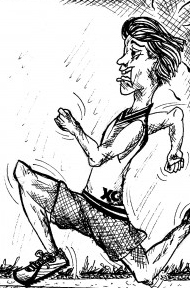
Yet the school system declares that after school workouts of student athletes in Missouri simply don’t count. Students are required to take Physical Education classes despite years of athletic training.
To be sure, this editorial is not a dig against P.E. classes. For students not engaged in sports or other physical activities, they can educate students about the importance of consistent exercise, the value of team play and the procedures to avoid injury.
The problem arises when students who already consistently participate on sports teams must take P.E. instead of another class. Athletes already know how to stretch, exercise and push themselves. Instead of putting them in a class where they’ll simply be bored, why not allow them to expand academically?
Take for example, the contrast between cross country, in which complete exhaustion is routine, and fitness walking, which is exactly what it sounds like. Both last a semester; in XC, students work out roughly 90 minutes a day, comparable to fitness walking. But in XC, students run, which burns roughly double the calories according to www.runnersworld.com. Inexplicably, the one that burns less calories is worth a credit.
The easiest reason to deny this credit is logistics; one could argue that keeping track of classes for athletes is difficult, as practices occur outside school. But we already have a template for more open-ended classes: independent studies. A student could sign up for a physical education independent study with a P.E. teacher. At the end of the season, the teacher could contact students’ coaches about performance, attendance, grade and effort.
Teachers aren’t compensated for independent study, so P.E. teachers might be reluctant to embrace change. However, class sizes would stay pretty large, as many students don’t engage in sports and many who do still take weight lifting; the school wouldn’t have to drop any P.E. teachers from payroll.
There isn’t a clear reason why Missouri doesn’t allow this. When contacted, a Communications Office spokesperson for DESE, the Department of Elementary and Secondary Education, said the department doesn’t have a stance on whether these classes could be used for P.E. credit. Our administration has a chance to spearhead a new type of physical education, the type that sports provides; fitness for a lifetime.
Our society needs to emphasize physical education — with almost a third of our youth obese, according to the National Council of State Legislatures, that is clear. But athletes know the importance of staying in shape, and they’re also students who would leap at the extra hour to take another class or study.
Students can roughly simulate this extra hour with online P.E. However, the problem is that it’s unclear where RBHS comes in; working with another school can lead to uncertainty about the validity of grades, not to mention the potential for cheating.
The trick comes at where to draw the line. Do club sports count? What about show choir? Dancers are pretty sweaty at the end of a set. For now, I’d say a full season of one MSHAA-recognized sport should count as a half-credit P.E. class since a season is roughly analogous to a semester.
It’s inefficient for students to take another semester of a class they have, in effect, already taken. Student athletes should have the option of using their sport as not only a tool to improve physically, but also academically. Administrators should work with district and state officials to make this a reality, and students should demand their hard work be rewarded.
By Adam Schoelz
LATEST NEWS
- Stress, anxiety skyrocket as students prepare for upcoming AP tests
- RBHS holds successful night of percussion
- Not even water?
- Solar eclipse to pass through Missouri, April 8
- How CPS is organized: a guide
- City of Columbia to hold school board election April 2
- Youth Election Participants to assist in upcoming municipal election
- City of Columbia hosts first Community Engagement Session for McKinney Building, hopes to gain public insight on the structure’s future
- RBHS Track Team Opener at Battle Gallery
- March Mathness Photo Gallery
Physical Education credits system unfair
April 25, 2013

Leave a Comment
More to Discover
@2021 - www.bearingnews.org





















































































